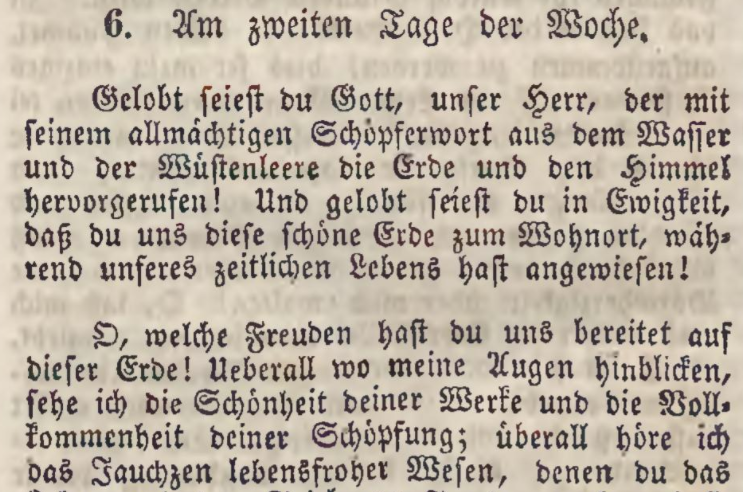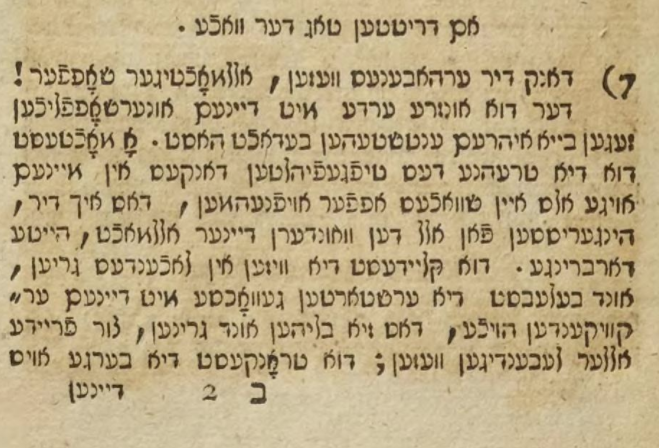| Source (German) | Translation (English) |
|---|---|
Für Sabath (№1). |
For Shabbat (№1). |
Schön ist es, o Gott! dir zu danken und deinem Namen zu lobsingen, Höchster! Heute an dem heiligen Tage, den du der Ruhe und der stillen Betrachtung gewidmet hast, heute, o Gott! will ich die Ruhe dazu anwenden, mich durch Gebet und fromme Betrachtungen im Glauben zu stärken und für den unsterblichen Theil meines Wesens Sorge zu tragen, welches während der sechs Tage der Woche, wegen mannigfacher Beschäftigungen und Bedürfnisse nicht möglich ist. |
It is good, O God, to give thanks to you and to sing praises to your name, Most High! (Psalms 92:2) Today, on the holy day that you have dedicated to rest and quiet contemplation, today, O God! I will use the rest to strengthen myself in faith through prayer and pious contemplation and to care for the immortal part of my being, which is not possible during the six days of the week, because of manifold occupations and needs. |
Als vollendet waren der Himmel und die Erde, als die große und unendliche Schöpfung da stand in ihrer hohen Pracht, als der erstaunte Mensch die ersten Freuden des Daseins empfand, da ruhtest du am siebenten Tage von deinem Wirken. Da nun aber die Vernunft uns lehrt, daß dein Wirken mit dem Wirken hinfälliger Geschöpfe nicht zu vergleichen ist, daß bei dir keine Ermüdung und keine Erschlaffung, kein Ausruhen und Erholen denkbar ist und daß allein dein Wort hinreichend war, das alles hervorzurufen, wie der heilige Sänger sich ausdrückt: „er sprach und es wurde, er gebot und es stand da” (Psalm 33, 9) so leuchtet es uns deutlich ein, daß du am siebenten Tage deswegen aufhörtest zu schaffen, um uns schwachen Sterblichen diesen Tag zur Ruhe und Erholung von unsern Mühseligkeiten zu geben, und daß du also uns hierin gleichsam als Vorbild und Muster vorleuchten wolltest. |
When the heavens and the earth were completed, when the great and infinite creation stood there in its high splendor, when the astonished Man felt the first joys of existence, then you rested from your work on the seventh day. But since Reason teaches us that your work cannot be compared with the work of feeble creatures, that with you no fatigue and no slackening, no rest and recovery is conceivable, and that your word alone was sufficient to bring about all this, as the holy singer expresses himself: “he spoke and it came to pass, he commanded and it stood there” (Psalm 33:9) so it is clear to us that you ceased to work on the seventh day for this reason, in order to give us weak mortals this day to rest and recover from our labors, and that you therefore wanted to shine before us in this, as it were, as an example and pattern. |
Ebenso hast du unsern Vorfahren in der Wüste am sechsten Tag die Speise vom Himmel doppelt gegeben, daß sie am siebenten Tag ruhen und durch die Muße, die ihnen der Ruhetag gewährt, zur Betrachtung über deine Güte und väterliche Fürsorge hingeleitet werden mögen. Dieß, o Allvater, ist die eigentliche Bestimmung, dieß der wahre Zweck des Ruhetages, und du selbst hast uns dieses so mannigfach offenbart. |
In the same way, on the sixth day, you gave our ancestors in the wilderness food from heaven twice, so that they might rest on the seventh day and be led to contemplate your goodness and fatherly care through the leisure that the day of rest affords them. This, O All-Father, is the true purpose of the day of rest, and you yourself have revealed this to us in so many ways. |
Nicht die körperliche Ruhe allein, die Sammlung des Gemüthes ist es, der ich die bessere Kenntniß von dir und deinen Eigenschaften verdanke. Denn in dieser Betrachtung, o Gott, erfreust du mich mit deinen Werken, und ich rufe mit dem gesalbten Sänger aus: „Wie groß sind deine Werke, o Herr! Wie tief und unergründlich deine Gedanken!” (Psalm 92, 6.) Wenn der Lasterhafte auch grünt und blüht eine kurze Zeit auf Erden, so verliere ich dennoch nicht das Vertrauen auf deine Güte und Gerechtigkeit, o Herr! denn er geht dennoch unter, dein Strafgericht trifft ihn sicherlich, und der Fromme grünt wie die Palme, wie die Ceder auf Libanon. |
It is not the bodily rest alone, but the gathering of the mind, to which I owe the better knowledge of you and your attributes. For in this contemplation, O God, you delight me with your works, and I exclaim with the anointed singer: “How great are your works, O Lord! How deep and unsearchable your thoughts!” (Psalm 92:6) Even if the wicked bud and flourish for a short time on earth, I will not lose my confidence in your goodness and righteousness, O Lord! for he nevertheless perishes, your judgment surely smites him, and the pious man grows like the palm tree, like the cedar in Lebanon.[1] Cf. 92:8-13. |
Ja, o Allvater, ich erkenne es mehr und mehr, alle Tage, an denen wir nur für unsere irdische Bedürfnisse uns abmühen, wären verloren aus unserm Leben, als hätten wir sie nie gelebt. Hätte uns deine Allgüte nicht den heiligen Sabath gegeben, den du Lust der Seele nennst (Jesaias 58, 13.). |
Yes, O All-Father, I realize it more and more, all the days in which we toil only for our earthly needs would be lost from our lives, as if we had never lived them, if your all-goodness had not given us the holy Sabath, which you call the delight of the soul (Isaiah 58:13). |
Hilf du mir, o gütiger Vater, deinen Tag mit der Würde zu feiern, wie ihm gebührt, auf daß mir zu Theil werde der Lohn, den du denen verheißen hast, die deinen Ruhetag heiligen: Du wirst ihnen geben in deinem Hause, spricht dein Prophet, einen Namen, einen ewigen Namen, der nie untergeht. Laß mich, o Allgütiger, der ewigen Freuden jener Welt, der Freuden des großen Ruhetages, theilhaftig werden, die deinen Verehrern aufbewahrt sind. Amen. |
Help me, O kind Father, to celebrate your day with the dignity it deserves, so that I may receive the reward you have promised to those who keep your day of rest holy: You will give them in your house, says your prophet, a name, an everlasting name, which shall never perish (Isaiah 56:5). Let me, O All-Good One, partake of the eternal joys of that world, the joys of the great day of rest, which are reserved for your devoted. Amen. |
“Für Sabath [№1]” was included by Yehoshua Heshil Miro in his anthology of teḥinot, בית יעקב (Beit Yaaqov) Allgemeines Gebetbuch für gebildete Frauen mosaischer Religion. It first appears in the 1829 edition, תחנות Teḥinot ein Gebetbuch für gebildete Frauenzimmer mosaischer Religion as teḥinah №11 on pp. 14-16. In the 1835 and 1842 editions, it also appears as teḥinah №11 on pp. 16-18. In a note to “Gebet am Tage der Gedächtnißfeier verstorbener Eltern, an deren Grabe zu sprechen” published in the 1835 edition, Miro records that Isaak Plessner sent this prayer to him, and from this we infer that its authorship may also be attributed to him.
We welcome corrections and improvements. The transcription of the German from Latin script in Fraktur type provided machine-readable text for a machine translation by DeepL, which we then edited for accuracy and clarity. –Aharon Varady
Source(s)


Notes
| 1 | Cf. 92:8-13. |
|---|

“Für Sabath [№1] | For Shabbat (№1), a teḥinah by Isaak Pleßner (1829)” is shared through the Open Siddur Project with a Creative Commons Attribution-ShareAlike 4.0 International copyleft license.



![Fürbitte für die Verstorbenen [no.2] (Yehoshua Heshil Miro 1829) - cropped](https://opensiddur.org/wp-content/uploads/2022/03/Furbitte-fur-die-Verstorbenen-no.2-Yehoshua-Heshil-Miro-1829-cropped-1.png)






Leave a Reply